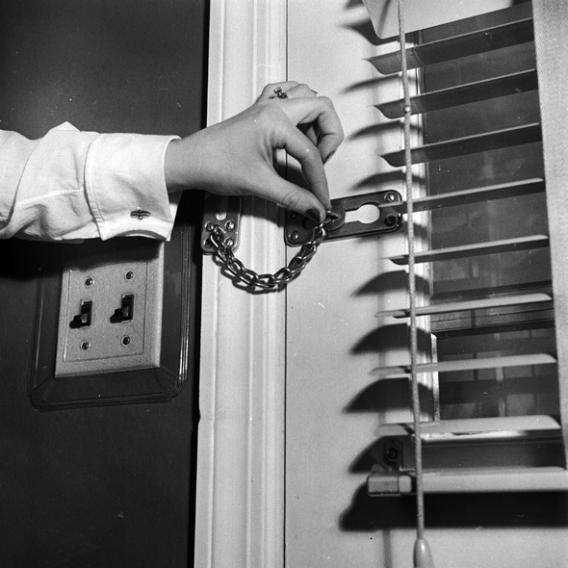In the opening post of this series, I described an ideal dinner party scenario: After taking their fill of food, drink, and amusing conversation, host and guest alike parted ways with the most pleasant of tastes in their mouths—a nip of cognac or Grand Marnier and perhaps a bit of quality chocolate. That those flavors lingered on the palate instead of less savory ones—acrid awkwardness, bitter confusion and indigestion-inducing shame, for example—resulted from the successful execution of one of the most difficult moves in the choreography of entertaining: saying goodbye.
After we instructed you in the ways of the well-executed arrival, many of you wrote in expressing trepidation regarding the other end of the evening, that inevitable point (unless, perhaps, you are entertaining in Barcelona in your early 20s, in which case, feel free to pasar de todo) in the festivities, usually between 11 p.m. and 2 a.m., when it becomes time for them to end. As one of you so eloquently put it, how do you politely “tell people after a dinner party to get the fuck out if they won’t leave?”
Well, speaking first of dinner parties, you might try that exact phrase; I actually often take a (less profane) jokey-honesty tack and announce, during a lull in the after-dinner conversation, that it is “time for you all to get out of my house. Goodnight!” And research shows that I am in good company, as this forum commenter demonstrates: “My stepfather holds up a needlepoint pillow (which my mother made a few years back) which says ‘Goodbye’ on it. Works like a treat.”
But, of course, such wryness is not appropriate for all occasions, nor do all hosts wish to be so brusque. Traditionally, a hostess gently signaled that it was time to collect your coat by remarking on the time, starting to clear the table, or inquiring about her guests’ transportation needs. The rituals of a standard dinner service also help keep everyone on schedule—if coffee and after-dinner drinks have been served, guests should expect to leave within an hour at most, ideally at the natural waning of the conversation.
If these soft communiqués are ignored, more forceful gestures include serving cold water, turning on the mood-killing overhead lights and/or cutting the music. (Whatever you do, do not open more wine or liquor if you truly wish to bring things to a close; anecdotally speaking, this seems to be the single biggest mistake struggling hosts make, especially when tipsy guests request it. If you are trying to be firm, booze will never help.) These methods, along with suggesting that the group move to a public establishment or warning everyone that your building or neighborhood has noise restrictions, are also probably the most effective for a larger party situation in which it is difficult to communicate your desires to everyone at once. Unless they have already expired on your couch, your sticky guests should get the hint that you’d now like to retire to your own bedroom in peace.
You might also keep in mind this lesson that my partner and I have, as entertainers of diverse acquaintance, had to learn the hard way: There are some people who are not yet equipped for even informal civilized events, and it is OK to exclude them until they get it together. Your home is not a bar; if you find yourself having to expel guests at 4 a.m. like a common bouncer, you may need to make some adjustments to your contact book the following morning.
Now, thus far, we’ve spoken of what a host can do to wind things down, but guests of dinner parties and larger gatherings obviously have their part to play as well. First, always keep in mind that your host has almost certainly been preparing for your visit for a solid few hours or even an entire day with cooking, cleaning, and decorating before you arrive. You may feel ready for a Big Night, but they will more likely be ready to call it one around the witching hour. Then, watch for the following cues: no more bottles are being opened or the hosts are putting the libations away; dishes are being cleared or light cleaning attempted; conversation is lagging and people are eyeing the clock; it is a weeknight (regardless of your personal routine, remember that most people like to get some sleep); you yourself are falling asleep, and have not been invited as an overnight guest; your hosts are holding open the door and screaming at you to please God go home. If any of these signals appear in the field of your senses, gracefully and with great gratitude take your leave.
As with whipping cream, there is an ideal time to stop, and a point beyond which things curdle. But with a dash of attention, a sprinkle of forthrightness, and a dollop of self-control, all parties can come to that best of conclusions—a happy ending.
